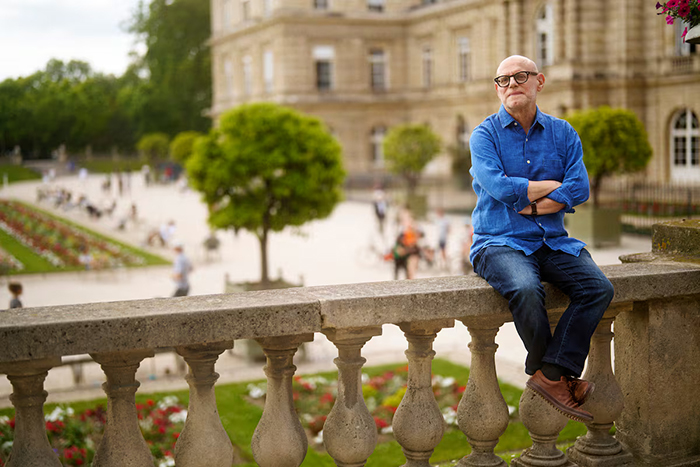Sous-total: $

Enzo Traverso, historian: ‘Germany is being complicit in a genocide in Gaza’
The Italian thinker reflects on the political uses of the past in the conflict between Israel and Hamas, and warns that the memory of the Holocaust could be discredited, especially among post-colonial minorities
A scholar of intellectual history, a specialist in totalitarianism and the politics of memory, the career of Enzo Traverso, 66, has focused on topics such as the Jewish question, the Holocaust and the revolutions of the 20th century. An admirer of Adorno and Walter Benjamin, he teaches classes on Marxism and critical theory. His books include Fire and Blood: The European Civil War, 1914–1945, The Jewish Question: History of a Marxist Debate and Revolution: An Intellectual History. Now he has just published Gaza davanti alla storia (or Gaza before history, available in Italian and Spanish), where he reflects on, as he sees it, the weaponization of anti-Semitism. And he warns of its consequences, among others, on the memory of the Holocaust.
Traverso shows up for the interview wearing a blue shirt. A few steps away is the Sorbonne University of Paris, where demonstrations in support of Palestinians took place in April. He alludes to these protests in his book, although he focuses more on the protests in the United States, where he teaches at Cornell University. He criticizes the fact that these protests have been repressed and that they have been surrounded by accusations of anti-Semitism. Traverso underscores that he is not a scholar of the Middle East or the Israeli-Palestinian conflict. What he seeks, as he clarifies in the foreword to the book, is to observe the political uses of the past that apply to the present.
Question. You have worked on the concept of memory and the memory of the Holocaust. What is the point if it doesn’t stop wars like this one?
Answer. The German case is the most compelling. There, after the war, the Holocaust was not talked about. Its acknowledgement is the product of a very difficult process of memory construction that developed over the course of decades. Starting in the 1980s, the country began to build a national identity that included the Holocaust. Today, saying I am German means recognizing that in the history of your own country there is a crime like the Holocaust. At that point it entered the German historical consciousness. And that had enormous positive consequences.
Q. Like which ones?
A. The citizenship code was changed and many immigrants were able to obtain German nationality. Germany was no longer thought of as a nation in the ethnic sense of the word, but as a nation in the political sense. Today, Germany says: “We have to atone for the Holocaust and that is why we have to support Israel unconditionally.” And the result is that it is being complicit in a genocide in Gaza. That is the contradiction. A singular transition occurred: from a historical assumption of responsibility to a subcontract of blame. Those who are paying the German debt are the Palestinians.
Q. Something went wrong in the treatment of memory…
A. It’s true, we have reached that paradoxical and dangerous situation: if fighting against anti-Semitism means supporting the war in Gaza and Israel unconditionally, the idea of the memory of the Holocaust is discredited in the eyes of public opinion and in the south of the world. Whether in the south specifically or here in the EU, citizens who have postcolonial roots are going to say: but how is this possible? I live in a country that proclaims the need to fight against anti-Semitism, does that mean supporting the massacre of Palestinians? If that is the situation, it means that when people talk to me about the Holocaust I will begin to have doubts: Could the Holocaust not be a myth that was invented to defend the interests of the Jews? There is a risk that this anti-Semitic stereotype and this form of Holocaust denial will suddenly become legitimized.
Q. Is there a danger of that happening now?
A. Yes. If in the name of the memory of the Holocaust we justify and support a genocide, that memory will be disqualified. And that will create misunderstandings and a new form of anti-Semitism. That memory had a meaning: it confirmed the extreme consequences of racism and after that genocide we cannot accept any form of exclusion, discrimination, persecution, oppression. With that conclusion, the memory of other genocides was built. If the memory of the Holocaust means supporting Israeli policy, all our references collapse.
Q. What do you mean when you say that the memory of the Holocaust built the memory of other genocides?
A. That of Rwanda, that of the Armenians, which happened earlier. If that genocide has recognition in the public sphere today, it is as a consequence of the memory of the Holocaust. The memory of Auschwitz made us more sensitive to the issue of human rights. If it is now instrumentalized to defend a genocide, it is something that destroys all memorial policies, the pedagogy of rights that was built for decades. Germany has the largest Palestinian community in the EU; what will a German of Palestinian origin think when he hears Chancellor Olaf Scholz say that support for Israel’s policy is a “reason of state” for Germans? We have to build another perspective, in which the memory of the Holocaust is articulated with other memories with the same legitimacy, first of all, those of colonialism and its genocides.
Q. Can we say that the memorial landscape in Europe is incomplete?
A. It is more than incomplete. Such strong contradictions have very negative consequences. When there are countries—and this is the case of EU countries with minorities of postcolonial origin, minorities of millions of people—with a memorial policy with such great contradictions, its effects are disastrous.
Q. What kind of effects?
A. We are seeing in the French banlieues a form of anti-Semitism. And the conflicts between Jews and North Africans are in many cases artificially created by these policies. Everything is done not so that they can coexist in a peaceful and fruitful way, but for conflict. Instead of condemning the discrimination they suffer in a prejudiced society, postcolonial minorities, particularly Muslims, are suspected of anti-Semitism and of sympathizing with Hamas, while the head of state goes to Tel Aviv and supports Israel. This crushes any idea of human rights and equality.
Q. Could we say that we are in a period similar to the period between world wars in Europe?
A. The radical right accepts the framework of liberal democracies, which they want to transform into something more authoritarian, more conservative and more xenophobic. They want laws about citizenship. They are not right-wing coup plotters like in Spain in 1936 or in Germany and Italy, who said “we want to subvert the institutions.” Classical fascism had a utopian dimension. It wanted to change the world, to create a new civilization, a new man… Today’s radical rights are very conservative. They want to protect citizens against the threats of globalization, defend traditional values, the homeland, the family, the nation, against the threat of immigration. They say ‘we are Christian countries and we are against Islam, which means terrorism.’
Q. One of the big differences is the technology, AI. Can it facilitate totalitarian or more authoritarian movements?
A. The new fascisms are not the concentration camps or the violence of the past. The forms of domination today are very different. New technologies can identify us. There are biopolitical forms of domination that do not require the endemic use of force. Control does not need a police officer on every corner; the cameras recognize us, they can tell what I did yesterday. That is what totalitarianism can mean now, let us be aware of that. These forms of domination are highly developed. But AI can be useful, put at the service of social progress. The philosopher Herbert Marcuse is right when he says that technology is not neutral. Technology is developed based on a project, which can be one of emancipation or domination.
Sara González, El País, 2 juillet 2024.
Photo: Manuel Braun
Lisez l’original ici.
 Mon compte
Mon compte






